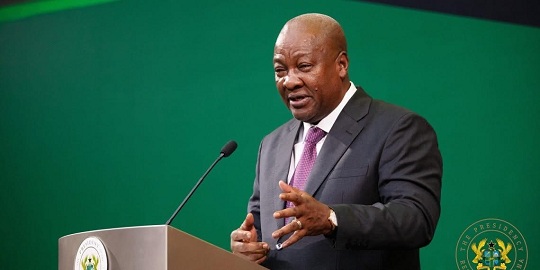President John Mahama has laid out his administration’s roadmap for economic recovery, telling business leaders at the 9th Ghana CEOs Summit and Awards Expo in Accra that Ghana must return to fiscal discipline and private sector-led growth.
The President said his government would focus on eight key pillars to stabilize and grow the economy.
Below is a breakdown of the proposed strategy:
1. Completing the IMF programme with discipline
The president underscored the importance of meeting targets under the ongoing IMF Extended Credit Facility programme, stressing that fiscal responsibility must guide government spending and borrowing.
Ghana is expected to complete its fourth IMF review in June 2025, with an exit strategy set for 2026. Post-programme engagement will focus on maintaining discipline and accountability in economic management.
2. Reopening access to domestic and international capital markets
To restore access to capital, the government plans to collaborate with the IMF, Ghana Stock Exchange, and financial institutions to reopen both domestic and international bond markets. Mahama noted that future borrowing will be linked strictly to self-financing government projects to prevent debt unsustainability.
3. Strengthening sovereign funds and local government financing
The administration will amend fiscal laws to enforce mandatory contributions to the Sinking and Stabilisation Funds to enhance financial resilience. Mahama also proposed empowering local governments to issue infrastructure bonds to finance critical community projects in roads, education, and water systems.
4. Clearing arrears and rationalising public investments
A national audit is underway to verify and clear legitimate government arrears transparently. Going forward, public investments will be prioritised based on need, value for money, and alignment with Ghana’s development agenda.
5. Accelerating public financial management reforms
To improve efficiency and fight waste, Mahama pledged to reactivate key financial management reforms. These include reintroducing the Treasury Single Account (TSA), strengthening tax collection systems, and deploying real-time budgeting tools to tighten expenditure controls.
6. Revitalising exports through Ghana Exim Bank
The Ghana Exim Bank will be repositioned to support non-traditional exports, agro-processing, light manufacturing, and small and medium enterprises (SMEs). This move is aimed at boosting foreign exchange earnings while stimulating job creation across key value chains.
7. Positioning Ghana as a regional trade and investment hub
He reiterated his vision to transform Ghana into a leading hub for trade, transport, and digital services in West Africa. This includes enhancing infrastructure in ports, financial services, healthcare, education, and industrial corridors, particularly in connection with the African Continental Free Trade Area (AfCFTA).
8. Resuming infrastructure development to stimulate growth
Infrastructure remains central to President Mahama’s growth agenda. His administration will invest in roads, energy, housing, water systems, and urban renewal projects using innovative financing models such as the Big Push Initiative, public-private partnerships (PPPs), and strategic bilateral collaborations.
The president’s address signalled a renewed focus on economic stability, job creation, and restoring hope through pragmatic leadership and targeted reforms.
As Ghana navigates its recovery path, the proposed strategy sets a comprehensive blueprint for sustainable national development.





